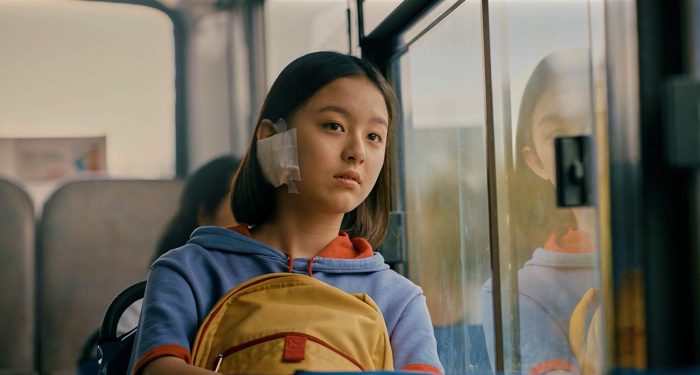‘House of Hummingbird’ Review: A Sublime Coming-of-Age Movie That Lingers on the Mind and Heart [Tribeca]

Nostalgic coming-of-age movies have become the order of the day as of late, but House of Hummingbird, which follows a lonely 14-year-old girl named Eun-hee as she navigates adolescence in ’90s South Korea, eschews the rose-colored glasses in favor of a magnifying glass. Directed by Bora Kim in her feature film debut, House of Hummingbird digs deep beneath the shine and luster of the rapidly industrializing Seoul of the ’90s and instead focuses on the cracks that were beginning to form under the surface, and the people who fell through those cracks.
Eun-hee and her working class family are those people living on the fringes of society. It’s clear right from the start in House of Hummingbird‘s opening shot, which lingers on an empty, weathered stairwell covered in white, discolored paint that is beginning to peel. Eun-hee stomps through that stairwell to her family’s cramped apartment, bringing home groceries that her mother brusquely takes from her without so much as a hello. It’s within those small moments and gestures that Kim deftly communicates Eun-hee’s unspoken isolation that she is forever attempting to tamp down, either by latching on to her siblings, her friends, or her crushes.
Newcomer Ji-hu Park is a revelation as Eun-hee, imbuing the timid preteen with a powerful sense of longing that nearly vibrates off her skin. Permitted little dialogue but for a few explosive outbursts that come at the emotional climax of the film, Park is a quiet force of nature in a remarkably introspective performance that heavily drives the slow-burning movie.
House of Hummingbird‘s meandering narrative cleverly avoids the well-worn hallmarks of a coming-of-age film, rarely allowing Eun-hee the kind of catharsis that she would receive in film typical of the genre. The sweet slice-of-life moments are appropriately awkward and fleeting — Eun-hee giving her crush a kiss in a stairwell, Eun-hee and her best friend skipping school to shoplift — and often give way to bitter twists as Eun-hee finds herself repeatedly abandoned or betrayed. Don’t let the sun-kissed ’90s setting mislead you: House of Hummingbird deconstructs that nostalgic sheen to uncover how deep and dark those cracks actually go.
Though an intimate portrait of a young girl’s complicated adolescence, House of Hummingbird is as much about South Korea as a whole. Kim takes an unflinching look at the vicious cycles of abuse that are ingrained in South Korean society. Though Eun-hee’s working class families are cast as victims in the rapidly expanding economy of the ’90s, they aren’t without their own glaring flaws: emotionally neglecting Eun-hee and turning a blind eye when her brother physically abuses her. But these shocking moments of abuse — which Kim depicts offscreen, or at a distance — become even more horrifying when it becomes apparent how common this is for Eun-hee, her sister, and her friends. In Eun-hee’s sweet, personal scenes, Kim takes a dreamy approach, but adopts a frank matter-of-fact lens for these abusive moments. The result is a disturbingly familiar, autobiographical portrayal that leaves echoes throughout the film even as it moves on to other things.
House of Hummingbird isn’t about Eun-hee’s abuse. It’s a formative part of her larger, lonely experience that gets small reprieves from time to time, whenever Eun-hee finds a deep connection with a new friend, a new boy, or a new teacher. Her greatest bond comes with a fellow lonely soul Young-ji (an effortlessly cool and charming Saebyuk Kim), her cram school teacher who becomes the first adult that finally listens to Eun-hee. There isn’t some great lesson that Eun-hee learns from Young-ji, nor a life-changing moral. It’s the temporary haven that Eun-hee finds in spending time with someone else who understands her.
But whenever Eun-hee seems close to achieving that validation or love that she so desires, things seem destined to snap back to the status quo. A frightening diagnosis and surgery that leaves her hospitalized briefly awakens her parents’ hidden affection for her, but bad grades bring back their ire. And a historic South Korean tragedy that would leave ripples on the country for years to come would upend Eun-hee’s life as well, in ways that she could never expect. But despite the unfortunate events that seem to define Eun-hee’s life, she’s remains resilient. And it’s in Eun-hee’s ability to overcome the adversity of her life that House of Hummingbird manages to maintain its buoyant nature, striking a balance between the sweet and the bitter.
House of Hummingbird is about a life marked by tragedy that succeeds because of it, not in spite of it. When Eun-hee recovers from her surgery, her doctor sadly remarks that she will likely keep its scars for the rest of her life. But (at risk of mixing cultural metaphors) like the Japanese art of highlighting the cracks in broken pottery, House of Hummingbird is about loving and embracing those scars.
/Film Rating: 9 out of 10
The post ‘House of Hummingbird’ Review: A Sublime Coming-of-Age Movie That Lingers on the Mind and Heart [Tribeca] appeared first on /Film.
from /Film http://bit.ly/2VBPdkE
via IFTTT
Comments
Post a Comment